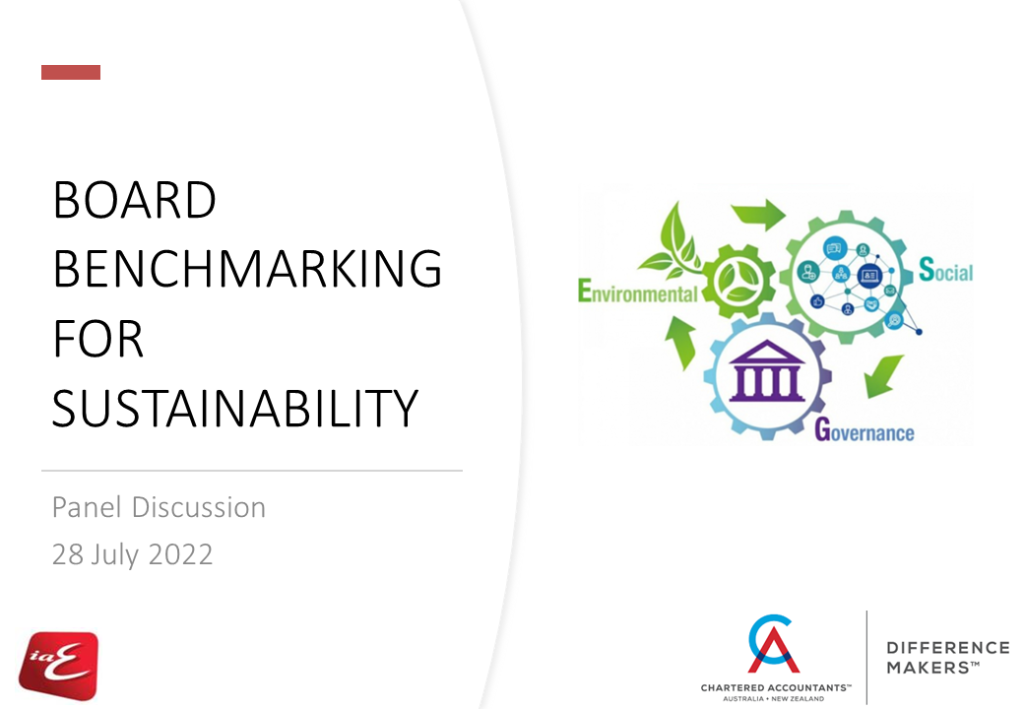Board Benchmarking for Sustainability
On 28 July, the Chartered Accountants of Australia and New Zealand (“CAANZ”) organised a panel discussion on board benchmarking on sustainability. This panel discussion was moderated by Mr Chong Kian Soon, our CEO and the panellists were Mr David Berry, the Chairman of the Malaysian Institute of Corporate Governance, Pn Wan Faizah, the founding CEO of Amanah Lestari Alam, an NGO set up by Bank Pembangunan Malaysia, Dr Veerinder, the Non-Executive Chairman of Tricor Services (Malaysia), Vice Chair of the International Chamber of Commerce’s Global Tax Commission, the past presidents of MIA, MICPA and CTIM, and Mr Nicholas Barnett the Executive Chairman of Insync, a Fellow of the Australian Institute of Company Directors (FAICD) and a former partner of KPMG and former chairmen of Ansvar Insurance, First Samuel and Ambit Group.
The panel discussion highlighted that increasingly, more and more institutional and mature investors started using the sustainability criteria in deciding their fund allocation and asset selection. The increased importance and focus from stakeholders on sustainability makes sustainability a significant strategy imperative. Boards shall now ensure that their companies’ strategic plan supports and includes the ESG considerations underpinning sustainability.
In Malaysia, the board’s sustainability responsibilities are provided in the latest Malaysian Code on Corporate Governance. Under practices 4.1 to 4.4, it is mentioned that the board shall be responsible to:
- set the company’s sustainability strategies, priorities and targets.
- consider sustainability when exercising its duties in strategic planning and risk management
- communicate with its internal and external stakeholders on the company’s sustainability strategies, priorities and targets.
- taking appropriate action to ensure they stay abreast with and understand the sustainability issues relevant to the company and its business,
To ensure all boards walk the talk, under the annual board and management performance evaluations, the board shall include a review of the performance of the Board in discharging the above sustainability responsibilities as well as in addressing the company’s material sustainability risks and opportunities.
In addition, the effectiveness of the board’s sustainability performance can also be judged by the quality of sustainability disclosures provided to the public. The recent Bursa Malaysia Review on Sustainability Disclosure shows that although the overall disclosure compliance is encouraging, the disclosure quality was unsatisfactory. Overall, there was a lack of disclosures relating to the reasoning for the chosen scope of sustainability, details on stakeholder engagement in the material sustainability matters, board validation and endorsement of the material sustainability matters, and the linkage between the remuneration of directors and senior management and sustainability-related KPIs.
Other key takeaways from the panel discussion include:
- Boards and companies do not emphasise sustainability because it interferes with their profits.
- The current board questionnaire appraisal approach shall be supplemented with a more granular approach, such as an interview session by an independent party to bring out honest inputs for board improvement.
- Board shall keep abreast with and appraise themselves against the evolving stakeholders’ expectations on sustainability.
- The finalisation of the two Exposure Drafts issued by the International Sustainability Standards Board shall provide clarity to the boards on the benchmark for the sustainability disclosures.
- Board shall set its direction and not overly rely on consultants in navigating their sustainability journey.
Interested viewers may drop us an email to request a password to log in to view the recording of the panel discussion session.


